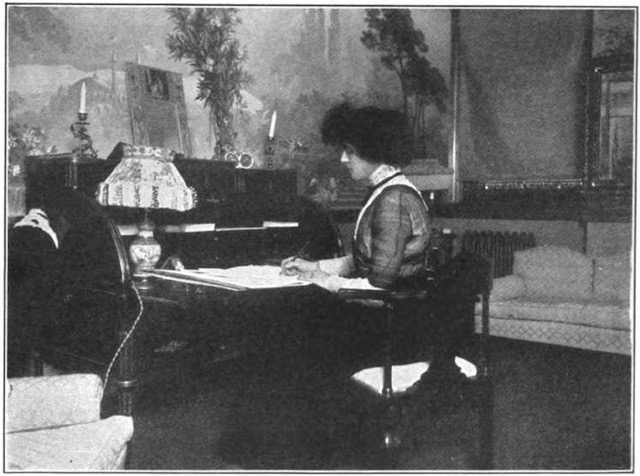—Johanna Neuman
This is the second of a series of posts in the run up to Women’s Equality Day from author and historian Johanna Neuman, about the women whose stories form the backbone of her new book, Gilded Suffragists: The New York Socialites Who Fought for Women’s Right to Vote.
 She was the first social figure to endorse women’s suffrage, the first media celebrity to endorse a political cause in the still young 20th Century.
She was the first social figure to endorse women’s suffrage, the first media celebrity to endorse a political cause in the still young 20th Century.
Described by Town Topics as “the perfect specimen of willful, wistful beauty,” the dark-haired Katherine Duer Mackay was an only child of social prestige and class privilege. Schooled by private tutors, summering in Newport, she was raised in a Manhattan home – believed to be the first in New York where the house servants wore uniforms. On a ship bound for Europe in the summer of 1896, she met Clarence Mackay, heir to a New Money fortune of silver mining and cable technology. On being introduced to the 21-year-old belle, Mackay saw at once her appeal, observing, “She’s as beautiful as her name.”
After marriage and children – and authorship of a thinly-veiled autobiographical novel in which she bemoaned unrequited love – Mackay shocked both High Society and the political establishment by running for a seat on the Roslyn, Long Island school board. The Mackays resided in a 628-acre estate there – designed by architect Stanford White and brimming with horse stables, dog kennels, gardens, garages and a house larger than the Parthenon.
The idea of a woman in government was still rare in politics, and all but unheard of in her circle. Friends, she reported, were “rather startled” she planned to attend meetings with men. The press was equally astonished. Her male opponent, Dr. J.H. Bogart, belittled her for representing “petticoat rule.” After she defeated him, Mackay pushed a reform agenda that included an end to corporal punishment, making her an immediate favorite with students, who scrawled on fences, sidewalks and barns the schoolboy graffiti, “Mrs. Mackay is All Right.” Showing considerable political acumen, Mackay persuaded Bogart to run for an open seat at the next election. This he did, winning the race, giving Mackay a reliable ally for her reforms. As the New York Herald put it, “His attitude toward the proposals that come from the woman who read him out of the school board and then read him back in again is now said to be as distinctly respectful and considerate as that clever woman could wish.” If she was a novice, she had proven herself an able politician, further enhancing her reputation.
When, a few years later, Mackay endorsed women’s suffrage, there was much excitement in movement circles, and some talk of putting her in a leadership role. News that Mackay would attend an Interurban Suffrage Council lecture at Carnegie Hall in December of 1908 electrified interest. “All of the boxes in the hall have been sold at good prices, every reserved seat has been engaged and there are … more applications for places on the platform than can be provided,” reported the Baltimore Sun.

Alice Stone Blackwell, whose mother Lucy Stone had campaigned with Elizabeth Cady Stanton and Susan B. Anthony in the lonely vineyards of nineteenth century activism, could barely contain her excitement. “Five dollars paid for single seats in the gallery merely to hear the speaking,” she exclaimed. “People clamoring for tickets …five hundred seated at table and five hundred turned away disappointed; people cheerfully paying two dollars for seats in another room, where they could not see the speakers during the luncheon, and submitting to uncomfortable crowding in a space far too small” — it was all a marvel. Blackwell knew that in the 1840s, when her mother had lectured against slavery and for women’s rights, so shocking was the specter of a woman speaking in public that men hissed or threw eggs. Now crowds were fighting for tickets to hear a female speaker. “Snobbery is a sorry thing, in a suffragist or in an anti,” Blackwell wrote, “but the suffragist has for so many years been sniffed at by the anti as an unfashionable, unpopular and unwomanly creature that she may perhaps be excused for breathing a sigh of relief…It is nice to have “smart” people demanding your tickets when they would not look at them before.”
Years later, she left the field, giving up her leadership position, her marriage and her standing to marry a man who professed to love her, but proved a cad who left her to marry a younger woman while she was dying from cancer. But for a brief moment in history, with the movement for women’s suffrage languishing in the doldrums, Mackay gave the cause a sense of panache, attracting many working class and club women who might otherwise have stayed on the sidelines and winning buckets of press coverage never before imagined.
 Johanna Neuman is a writer, historian and scholar in residence at American University in Washington, D.C. An award-winning journalist and former Nieman Fellow at Harvard, she covered the White House, the State Department and Congress for the Los Angeles Times andUSA Today. She is the author of Gilded Suffragists: The New York Socialites Who Fought for Women’s Right to Vote, available for pre-order now.
Johanna Neuman is a writer, historian and scholar in residence at American University in Washington, D.C. An award-winning journalist and former Nieman Fellow at Harvard, she covered the White House, the State Department and Congress for the Los Angeles Times andUSA Today. She is the author of Gilded Suffragists: The New York Socialites Who Fought for Women’s Right to Vote, available for pre-order now.
Join Book Culture and Harper’s Magazine on Tuesday, September 12th at 7pm for a discussion with Johanna on Gilded Suffragists.
Keep up with Johanna online and on Twitter.


